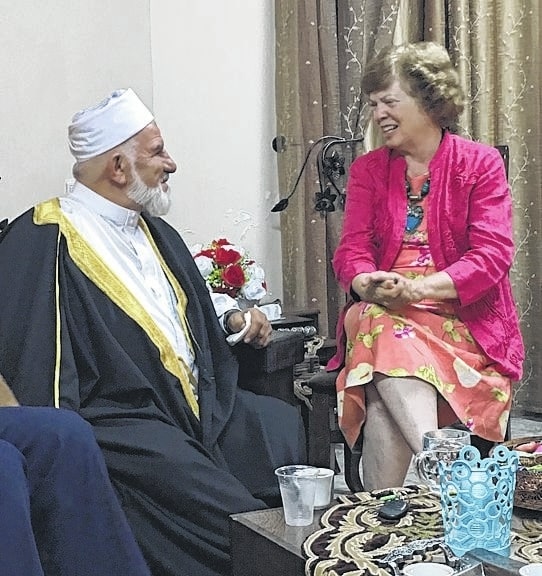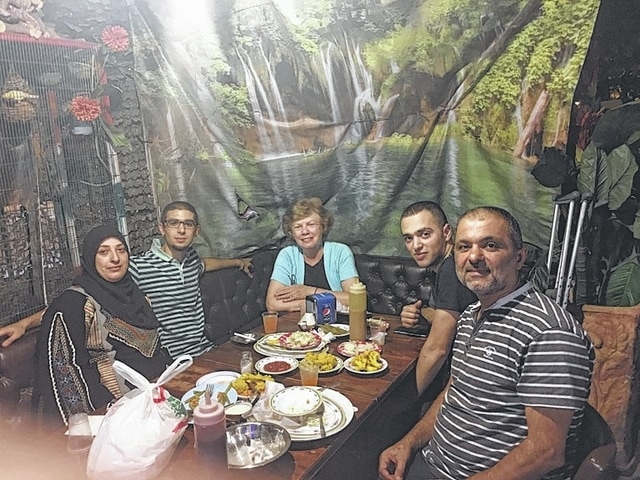

MINSTER — The international news has been peppered lately with articles and opinion pieces about the ill treatment of Arab citizens of Israel by their country’s government.
A Minster woman recently found out first hand how Arabs live in the Jewish state. She joined a Dayton-based group of 11 volunteers headed by Martha Moody, a Jewish woman, who, for the last eight years has organized trips to Galilee so that volunteers can teach English to Arab Israeli middle school students at a summer camp. The volunteers stay in Arab family homes.
The project, Moody said, is about “giving smart young people tools” to get ahead in Israel.
Mary Ann Olding was already a world-traveler when she learned of the opportunity earlier this year. Raised a Catholic, she spent 20 years tracking down Holocaust survivors in Europe. She made more than a dozen trips to Cuba in the five years before relations opened between the United States and that island nation. She has visited Australia, China, Korea, South America, Russia and countless other places to do contract research for clients.
But this was her first trip to the Middle East.
“I stepped into this (political situation) not knowing,” Olding said.
During the first week of the 17-day trip, the group toured Jerusalem, Tel Aviv, Haifa, Bethlehem and Acre, where Crusaders arrived in 1091.
Then, Olding was welcomed into the home of Meriam and Khalid Badran in Magd al-Krum, a village of 14,000 people in far northern section of Israel, near the Sea of Galilee. They and their six children hosted Olding as she taught in Deir al Asad, a nearby village.
Khalid understood English, but an adult son, Mohammed, was more fluent and often acted as translator.
“Meriam didn’t talk to me,” Olding said. “I would talk very slowly so the father would understand. But I saw her nodding. She (understood), too.”
The Arab villages are built into hillsides, built on foundations of previous cities.
“There’s lots of dust, no parks, very little water. It’s a harsh environment,” Olding said. The section of the Middle East that includes modern-day Israel was under British rule from 1920 to 1948, when Israel gained independence as a predominately Jewish state.
“The British were pulling out. Arabs were at the mercy of the majority,” Mohammed told Olding. There has been conflict between Israeli Jews and Israeli Muslims ever since.
“Do you feel like second-class citizens?” Olding asked Khalid.
“No, much lower,” he answered. The feeling was borne out in the teens that Olding taught, too.
Moody suggests that the volunteers create teaching units specific to them. For instance, a couple of lawyers devised mock trials with the students. Olding showed PowerPoint slides of her travels, distributed world maps and talked about her work as a researcher.
“I gave them some of my research on Godfrey Brown, a former slave,” she said.
“Mary Ann talked about a black town of freed slaves,” Moody said. “(The kids) really liked that. They told me about it later.”
“They identify with slaves because they feel like slaves in Israel,” Olding said. “There are certain professions they can’t be. Their taxes are higher (than the taxes of Jews).”
She asked the teens where they would like to travel. Some had already visited Jordan, Italy, England and Turkey. All of them hope to come to the U.S.
“They want to see, in this order, Disneyland, New York City and Los Angeles,” Olding said. “They had never heard of Ohio.” Her students were “typical teenage kids,” she added. But they came from families wealthy enough to send them to summer camp. All of them spoke some degree of English, “but their accents are terrible,” Moody said. That’s because they learned English from Arab speakers.
“The kids want to learn English,” she added. “This is an opportunity to speak with native speakers.” They come from five surrounding villages and this year included Muslim, Bedouin and Christian children. Olding taught four one-hour classes daily for six days.
She asked her students to write essays about their lives and talked with them about the history of Cincinnati, where she lived for a number of years. She discussed the various immigrant groups who settled the city over time and how each minority was mistreated by those who had come before. It was a topic that resonated with her students and her hosts.
“I was so far away from knowing what went on. Once I was with this family, I got it,” Olding said.
The Badrans took her to the site of their ancestral home. The town is in ruins now, destroyed, they told Olding, by the Israelis and the British during and immediately after the 1948 war.
“This was our home,” Mohammed told her as he stood on the remains of a foundation.
“How do you know,” she asked him.
“My grandmother, before she died, brought me here and showed me,” he said.
Olding also visited an archaeological dig at the historic site of Massada.
“You can walk in the tunnels. You see old store fronts. For an archeaological historian like me, I was in heaven,” she said. “It seems like Palestine was always a haven for people wanting to start over.”
When Olding told Khalid that she wanted to visit his mosque and meet the person who ran it, her host arranged for her to meet the Emam of Israel, Ali Kewan, the religious leader of all the country’s Muslims.
The meeting happened almost on the spur of the moment. Olding had dressed in a skirt and a jacket with long sleeves, to be clad appropriately to attend a wedding. Khalid called to her and said, “Emam lives in this town and he’s coming at 5 p.m. to meet you.”
“(Kewan) was a kind, hospitable, soothing person and Khalid was so proud to have him in his house,” Olding said. “He wasn’t interested in where I was from. He talked about what his life was like — newspapers calling for his opinion on world events, his calling. I was honored (to meet with him) and I was glad I had long sleeves.”
While she wouldn’t admit that the trip was fun, Olding said she would love to go back.
“It’s the perfect way for me to fulfill all the needs I have when I travel,” she said. “I get to know people, the landscape, history, cultural differences. This opened up a whole new civilization I knew so little about.



